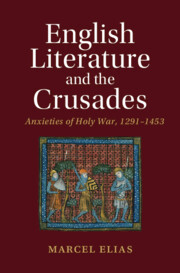Book contents
- English Literature and the Crusades
- Cambridge Studies in Medieval Literature
- English Literature and the Crusades
- Copyright page
- Dedication
- Contents
- Acknowledgments
- Introduction
- Chapter 1 Royal Emotions, Blasphemy, and (Dis)unity in The Siege of Milan and The Sultan of Babylon
- Chapter 2 Hopes and Anxieties of Conversion in the Otuel Romances
- Chapter 3 Women, God, and Other Crusading Motives in Guy of Warwick
- Chapter 4 Therapeutic Crusading and Excessive Violence in The Siege of Jerusalem and Richard Coeur de Lion
- Conclusion
- Notes
- Bibliography
- Index
- Cambridge Studies in Medieval Literature
Chapter 4 - Therapeutic Crusading and Excessive Violence in The Siege of Jerusalem and Richard Coeur de Lion
Published online by Cambridge University Press: 17 October 2024
- English Literature and the Crusades
- Cambridge Studies in Medieval Literature
- English Literature and the Crusades
- Copyright page
- Dedication
- Contents
- Acknowledgments
- Introduction
- Chapter 1 Royal Emotions, Blasphemy, and (Dis)unity in The Siege of Milan and The Sultan of Babylon
- Chapter 2 Hopes and Anxieties of Conversion in the Otuel Romances
- Chapter 3 Women, God, and Other Crusading Motives in Guy of Warwick
- Chapter 4 Therapeutic Crusading and Excessive Violence in The Siege of Jerusalem and Richard Coeur de Lion
- Conclusion
- Notes
- Bibliography
- Index
- Cambridge Studies in Medieval Literature
Summary
The final chapter considers tensions between beliefs in the “healthy,” salvific character of crusading and anxieties about the morality of violence. It argues that, finding their origins in events that took place during the First Crusade, these tensions became especially acute in late medieval crusade culture, crystallizing in works by John Gower, John Wyclif, and Michel Pintoin, among others, and complexly articulated in The Siege of Jerusalem and Richard Coeur de Lion. The chapter reads these romances alongside literary and historical responses to the Christian conquest of Jerusalem in 1099, pogroms against Europe’s Jewish communities, and acts of cannibalism perpetrated by crusaders at the siege of Ma‘arra in 1098. The Siege of Jerusalem, Richard Coeur de Lion, and authors who wrote about these events deployed similar representational strategies to raise questions about the corruptive potential and human costs of holy war.
- Type
- Chapter
- Information
- English Literature and the CrusadesAnxieties of Holy War, 1291–1453, pp. 99 - 130Publisher: Cambridge University PressPrint publication year: 2024

